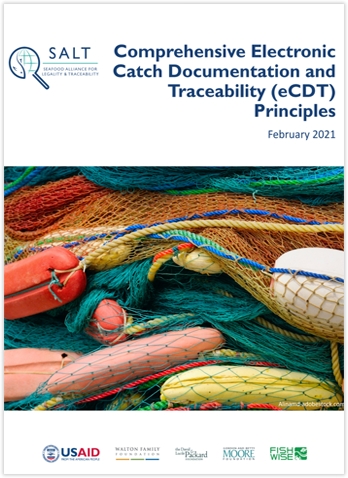Comprehensive Traceability Principles
Address data and verification needs across fisheries and supply chains
Different stakeholders and nodes of the supply chain will have different data and verification needs. Recognize these particular needs while also considering how to safely and equitably collect, store, and share that data while upholding worker voice, engaging workers throughout the process, and supporting worker-driven initiatives.
Full description
Design eCDT program with unique data and verification needs in mind. Implement privacy and data access protocols that mitigate negative impacts on worker rights. Monitoring through eCDT depends on being able to:
(a) rely on the validity of the data and,
(b) apply the collected information in a timely manner for regulatory and management interventions.
APPLY THE PRINCIPLE
There are three main phases to building an electronic catch documentation and traceability (eCDT) program:
INITIATE – includes early research, goal setting, and stakeholder engagement;
DESIGN – includes identifying technology, assigning responsibilities, and creating the systems to support the program;
IMPLEMENT – includes piloting the program, adaptively managing, and scaling it.
Here you can see how this principle manifests throughout each phase.
- Map data needs and constraints along full supply chain
- Map key data elements (KDEs) to critical tracking events (CTEs) within affected supply chains and identify where CTEs start and end given the different jurisdictions among different players (e.g., regulators, stakeholders, regional bodies, etc.). From this, define the minimum data required to meet program objectives
- Design eCDT program with verification needs and challenges in mind
- Create a data quality assurance protocol that includes a plan for verification
- Ensure data access protocols
- Clearly define who has access to the data and for what purpose, with special considerations to worker privacy
- Identify how worker welfare will be monitored and supported
- Identify governing agencies that have jurisdiction over data related to worker welfare and data security issues (e.g., Departments of Labor and/or Employment and enforcement of minimum wage, immigration status, and healthcare requirements) to increase the relevance and interoperability of any social data collected by the eCDT program. Identify existing protocols for how to share social data with agencies that oversee worker information
- Implement safeguards to mitigate negative impacts to worker rights and privacy when collecting eCDT data
- Consult existing data privacy laws and identify processes, accountability mechanisms, or new schemes for responding to privacy considerations and stakeholder/user concerns as needed
- Confirm that the data verification plan and access protocols are maintained and supported

